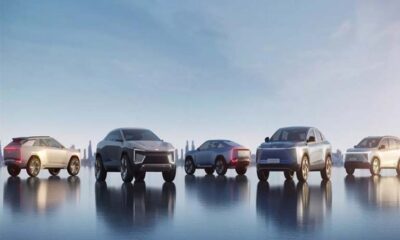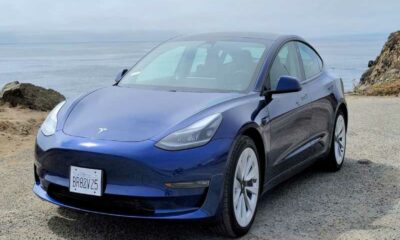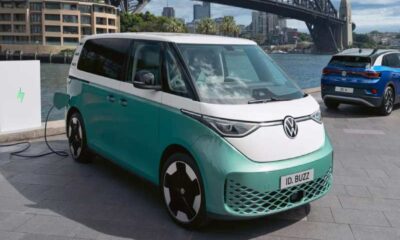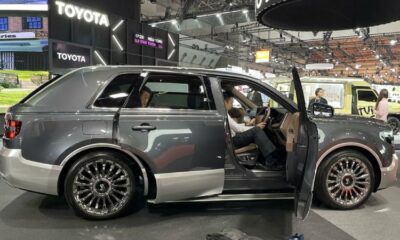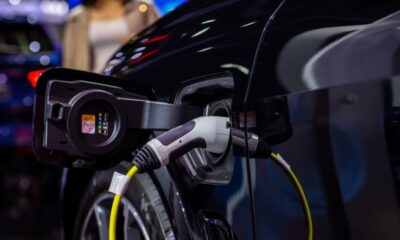Tech
Top 5 Chinese brands to keep an eye on in 2024 are producing the most exciting electric vehicles
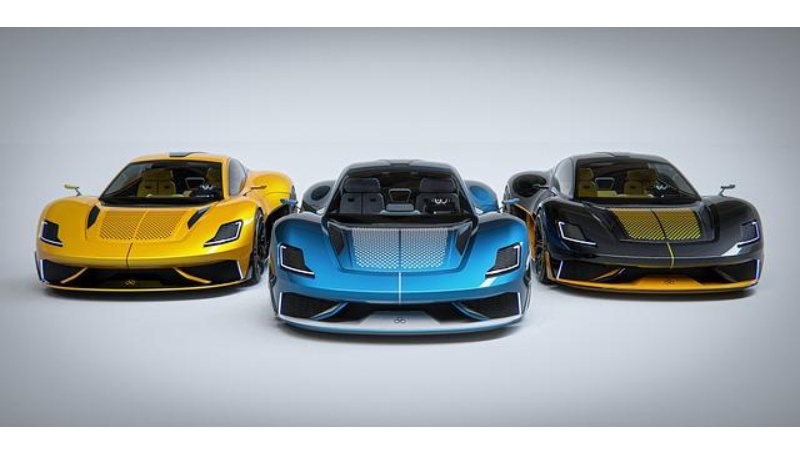
China is the world’s largest producer of EVs. Data from 2022 indicates that 6.8 million electric vehicles were sold in its home market in that 12 months, compared to about 800,000 in North America—which is still fighting for the title of world’s superpower—during that same period.
There are many financial reasons for why this occurred, ranging from government subsidies and incentives to the choice to address air pollution and reduce the country’s reliance on foreign oil. Regardless of your political stance, China is undeniably one of the biggest early adopters of electric vehicles.
When EVs were still a fringe idea, the country placed a large wager on them because it realized it couldn’t compete with the establishment in terms of internal combustion engine technology. The risk seems to be paying off.
To the extent that the “flood” of low-cost Chinese electric vehicles are making their way into European markets has prompted the European Commission to open an investigation. Tariffs on Chinese imports may be implemented to prevent competition from pricing out “legacy” automakers like the Volkswagen Group and Mercedes-Benz of Germany.
The US government has taken a similar action, changing the terms of its federal tax credit program so that it only applies to electric vehicles that are assembled in North America or other nations with which the US has free trade agreements and get the majority of their raw materials from the domestic market.
This is a direct reaction to trade with “Foreign Entities of Concern,” or FEOC, which includes China, North Korea, Russia, and Iran.
Unfortunately, government interventions such as these are keeping many Chinese start-ups mired in relative obscurity in many other markets, as there is a great deal of innovation to be excited about. However, that might start to change.
In light of that, these are the five Chinese EV companies that you’ve probably never heard of. and the reasons behind it, so pay attention.
- Xpeng
Guangzhou Xiaopeng Automotive Technology, also known as Xpeng, is presently exploring a wide range of areas. Luxurious electric SUVs, Tesla-baiting saloons, and even advanced electrical vertical take-off and landing craft. Yes, it has already moved well beyond considering the automobile to be the primary means of urban transportation.
Back on land, however, the company is already establishing itself in some European markets thanks to the P7 electric saloon, which boasts cutting-edge levels of self-driving technology and an electric range of 706 km (438 miles), which will gladly embarrass a Porsche 911.
Additionally, the company unveiled its flagship luxury SUV, the G9, which is a clever combination of 800V architecture for fast charging, sophisticated LiDAR systems hidden in its all-LED headlamps, and an equally impressive electric range as its saloon sibling.
Luxurious materials adorn the interiors, and the infotainment systems are powered by Xmart OS, the brand’s proprietary operating system that enables remote parking, over-the-air updates, and advanced voice assistance.
This operating system has already undergone several updates in China, bringing AI-powered assistants, more advanced autonomous driving features, and remote summoning technology.
It’s amazing to think that Mercedes-Benz is only now waxing poetic about its MB.OS, which won’t be fully realized until next year.
- Yang Wang
After you get over your initial giggles at the name, you’ll discover that YangWang is the high-end division of BYD, the massive Chinese automaker that is also well known for producing fantastic EVs.
The U9 is the company’s attempt at creating a true all-electric supercar, and in addition to looking the part, it has some technologically impressive features. The car’s capacity to jump—like a cat on a hot tin roof—is the most important feature.
That’s correct, the brand’s DiSus-X “body control system” has cutting-edge hydraulics that enables it to dive and jump. These hydraulics are comparable to those we saw in action at Porsche’s most recent Panamera preview event.
According to YangWang, the same technology can also enable it to travel on just three wheels, which is comforting even though it seems a little crazy.
Aside from attention-grabbing tricks, the U9 has four electric motors that can produce a total power output of 808kW or more than 1,000 horsepower. It follows the similarly potent U8 SUV as the second car to bear the YangWang badge.
In a press conference, parent company BYD stated that the U9 would retail for about 1 million yuan in its home market, or about $140,000, £110,000, or AUS $210,000. A lot of shove for the money, that.
- Zeekr
Okay, so Zeekr, another division of Chinese behemoth Geely Automobile Holdings (Volvo, Lotus, LEVC taxis, and more), is a name that should be familiar to anyone with even the slightest interest in contemporary EVs.
Thanks to a lineup that features chic city crossovers and fashionable shooting brakes (who said estate cars were obsolete? ), it is already making waves in Europe, and Geely has declared its intention to gain popularity in North America soon.
Once more, Zeekr’s EV offerings are spot on. Let’s start with the generous range, which in long-range rear-wheel drive 001 models easily ticks over 400 miles. It makes sense that the performance is strong, as some models have power outputs exceeding 500 horsepower. Even the 001 FR model, which has 1,265 horsepower, is available.
The Zeekr 001 is a car that was created to compete with Tesla’s all-conquering Model S. It is much less expensive in Europe and offers much of the same performance, range, and interior technology.
The company declares that the 007 is the first model to be offered in the mainstream market, but it has already unveiled the larger 009 model in China.
The cost? It’s rumored to be approximately $32,200 / £25,000 / AUS$48,000, even though the mid-sized sedan can easily compete with much larger competitors and cost much more, like Mercedes-Benz, Audi, and more.
- Wuling
China’s progressive approach to technology is largely responsible for the excitement surrounding the country’s burgeoning EV industry. This has prompted tech giant Huawei, for example, to produce cars, and the nation also makes powerful, road trip-friendly devices at affordable prices.
Wuling, on the other hand, produces a tiny city car that costs about $4,500 / £3,500 / AUS$6,650, which is very much at the other end of the spectrum. It consequently outsells the Tesla Model 3 in its home market with ease.
In reality, Wuling and its Hongguang Mini EV are a joint venture between General Motors and SAIC Motors, the biggest automaker in China. Together, they have created a runaround that is even more compact than a Fiat 500. Due to its affordable asking price, inner-city youth who desire independence without the expenses that come with it are drawn to it.
Although there’s not much information about it being sold overseas just yet, an upgraded Hongguang went on sale in Indonesia late last year and quickly surpassed Hyundai, Genesis, Lexus, and other EVs in sales.
- Nio
Even though Nio is one of the more well-known EV brands to come out of China (place it alongside BYD and Zeekr), it is still very much in the lead. It becomes part of an army of Chinese startups that are steadily undermining Tesla’s success both within and outside of their own country.
Nio recently declared that it would not be forced into a pricing war with Tesla, maintaining its position and providing what it considers to be a high-end product at a fair cost.
Numerous Nio products, including the ET5 saloon (a car built in Europe for Europe), have received favorable early reviews thus far, supporting the company’s audacious pricing claim. Autocar suggests the ET5 is a competitive alternative to the Tesla Model 3 and BMW i4.
Back in Shanghai, Nio has an alluring lineup that includes svelte SUVs, coupes, estate cars, and its incredible EP9 performance car, which demonstrated that an electric motoring startup could produce an exciting vehicle even though it was sold in extremely small quantities.
Beyond its selection of fashionable, high-tech electric vehicles, what really interests me about Nio is its innovations in the field of customer experience. Even though it isn’t totally novel, its Nio Power battery swap technology is the first to be properly implemented and made accessible to the general public.
An entire EV battery can be replaced by the system in less than five minutes, and the car can handle the entire procedure on its own. Just pull up to a battery swap station and let Nio’s tech handle the labor-intensive work.
This helps the owner not only with range anxiety but also lowers the cost of owning an EV because Nio leases the battery to the customer instead of including it in the sticker price, which is one of the most expensive parts of an EV.
-

 Sports4 weeks ago
Sports4 weeks agoAl Ahly vs Inter Miami, 2025 FIFA Club World Cup – Preview, Prediction, Predicted Lineups and How to Watch
-
Health3 weeks ago
Back to Roots: Ayurveda Offers Natural Cure for Common Hair Woes
-

 Tech3 weeks ago
Tech3 weeks agoFrom Soil to Silicon: The Rise of Agriculture AI and Drone Innovations in 2025
-

 Startup4 weeks ago
Startup4 weeks agoHow Instagram Is Driving Global Social Media Marketing Trends
-

 Science5 days ago
Science5 days agoJuly Full Moon 2025: Everything You Should Need to Know, When and Where to See Buck Moon
-

 Sports3 weeks ago
Sports3 weeks agoFIBA 3×3 World Cup 2025: Full Schedule, Preview, and How to Watch
-

 Gadget3 weeks ago
Gadget3 weeks agoThings to Know about Samsung Galaxy S26: What’s New and What’s Next
-

 Sports4 weeks ago
Sports4 weeks agoWorld Judo Championships 2025: Full Schedule, Date, Time, Key Athletes and How to Watch

